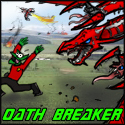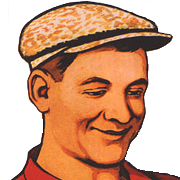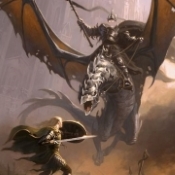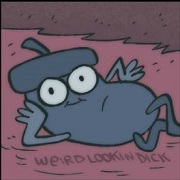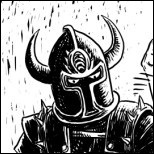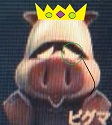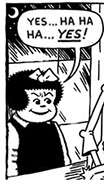moths posted:That's not really a viewpoint which is compatible with reality, fiction, or gaming.
|
|
|
|
|

|
| # ? May 26, 2024 00:04 |
|
Nessus posted:The idea here is that Mr. Spock would be modeled with a thick stack of skills, some of them probably esoteric in nature due to Vulcan education, and perhaps a couple of quantifiable advantages ("Spock can do advanced math in his head") vs. Gomer, who has many fewer of these (but may have some kind of Lynchian insight ability), as opposed to making Spock INT 21 and Gomer INT 7.
|
|
|
|
Spocks also massively physically strong, he just doesn't generally use it because he reasons his way out of problems because that's his culture and he is a strongly moral person. He's also incredibly patient given he works with a massive racist who never gets pulled up for it even when he chats poo poo in front of their mutual boss. In a fantasy setting you will get physiological differences between species, but it's monocultures and the notion that species are intrinsically evil and spend all their time being evil rather than they are part of a hosed up society or they are private security for a messed up wizard. The notion that other people don't have cultures or a society is a colonial one. The idea of a dungeon crawl against sentient opponents who are just randomly there is weird in and of itself. It'd be like going through an apartment building murdering the inhabitants to steal their stuff. D&D is basically a giant rip off of Tolkien so uses those racial tropes for dark skinned evil orcs. But doesn't stop to acknowledge that these orcs live in a hellscape ruled over by an evil demigod that really exists and this informs how they act.
|
|
|
|
|
Thundercloud posted:D&D is basically a giant rip off of Tolkien so uses those racial tropes for dark skinned evil orcs. But doesn't stop to acknowledge that these orcs live in a hellscape ruled over by an evil demigod that really exists and this informs how they act. Tolkein's orcs are way more racist stereotypes of asians (he describes them as sallow-skinned, squinty eyed and 'Mongol-types') than they are of black people. The rampant association of orcs with black people and 'savages' and their assorted tropes (never builds anything on their own, only steals and destroys what others make, etc etc) came a bit later and probably owes a fair bit to D&D.
|
|
|
|
Nessus posted:The idea here is that Mr. Spock would be modeled with a thick stack of skills, some of them probably esoteric in nature due to Vulcan education, and perhaps a couple of quantifiable advantages ("Spock can do advanced math in his head") vs. Gomer, who has many fewer of these (but may have some kind of Lynchian insight ability), as opposed to making Spock INT 21 and Gomer INT 7. Ratoslov posted:And, furthermore, Spock would end up having holes in his education where he's dumb as anyone rather than having a default higher than Gomer's skilled roll, representing that Spock can just figure out how to repair a cracked engine block on a 1963 Chevy Impala from first principles better than Gomer could ever hope to with years of training and experience because he's smaaaaart.
|
|
|
|
Rand Brittain posted:Isn't that because there are very few seriously athletic people who aren't at least "pretty good" at all the components of strength, whereas there are plenty of "very intelligent" people who combine a lot of one kind of intelligence with serious deficiencies in another? I'd suggest there are very few seriously athletic people who aren't also at least "pretty good" at dexterity and constitution/stamina, which makes it seem pretty arbitrary why we have those commonly as separate attributes in games. At least from the perspective of modeling human capability. From a game perspective of course, it makes more sense. Which isn't, of course, an argument against getting rid of "intelligence" as a specific stat, given its fraught history. But that's not because its unique among the common attributes in RPGs to poorly model the diversity of capabilities under its heading.
|
|
|
dwarf74 posted:If the alternative is a fuckton of narrow skills like some high-sim monstrosity from the 90's, that's a pretty poo poo alternative. The way that the new Star Trek Modiphius game is pretty great, breaking up skills into the various departments on a ship.
|
|
|
|
|
It also doesn't have an int stat. (You could argue it has 3, with control being "I'm good at manipulating science devices" and Reason being "I'm good at logic puzzles" and Intuition being 'I'm good at making educated guesses)
|
|
|
|
I don't disagree with the basic argument, but citing Spock or Star Trek is a really bad example for showing characters with differing types of "smart" (for the show anyway, the RPG might be better). With the exception of medical stuff (and sometimes even then), pretty much everyone related to science or engineering is a polymath and competent in whatever sort of specific end application the plot requires. Going back in time or dealing with unusual/ancient/whatever unfamiliar tech and doing it better than the locals is a thing that happens semi-regularly in the series. Trek is very much a show that pushes the stereotype that smarts = universal proficiency, though often as a trope this is at the expense of emotional intelligence in some form.
|
|
|
|
It is also disingenuous as gently caress to take an argument about how intelligence works in the real world and provide two fictional characters as a counterpoint. Like, dude, you've literally just provided an example of what we're talking about. People like Spock don't exist and playing up people with "low intelligence" for humor is problematic as gently caress.
|
|
|
|
dwarf74 posted:If the alternative is a fuckton of narrow skills like some high-sim monstrosity from the 90's, that's a pretty poo poo alternative. One alternative is to use stats to place the character in a genre role (or roles) instead. Which for D&D might be best done as something like this: Take a +2 or a +1/+1 in each category Brawl Shoot Help Explode Force Sneak Know Pray Scare Con Lead Inspire
|
|
|
|
Elector_Nerdlingen posted:One alternative is to use stats to place the character in a genre role (or roles) instead. Generally every rating a character has in a game is or should be a way to interact with an aspect of the game. Mechanically, the rating is nothing except a way to interact with the game system, and the name or fiction spun around it is purely flavour. The attributes of the original D&D are: Primary Fighter Attribute Primary Magic-User Attribute With Secondary Language Applications Primary Cleric Attribute Archery Attribute Hit Points & Survival Chance Attribute Hireling Interactions Attribute Their flavourful names are just a convenience.
|
|
|
Elector_Nerdlingen posted:One alternative is to use stats to place the character in a genre role (or roles) instead. Back when we were all making 4e heartbreakers, I was pitching the concept of letting the individual players choose what their stats are. Your wizard could have an 18 Intelligence and a 6 Constitution, while my wizard would have an 18 Infernal Contract and a 6 Criminal Status. Your wizard would know lots of things but get winded climbing stairs. My wizard would have tons of influence over hell, but was wanted by the cops for all the demon crimes. They'd both cast fireball based on their primary stat. Never quite came together, but I'm still convinced I have something there.
|
|
|
|
|
Thundercloud posted:Spocks also massively physically strong, he just doesn't generally use it because he reasons his way out of problems because that's his culture and he is a strongly moral person. I mean, Vulcans are pretty much Space Elves, so they're better at everything than humans. Except being impulsive. Humans are great at that.
|
|
|
|
Zurui posted:It is also disingenuous as gently caress to take an argument about how intelligence works in the real world and provide two fictional characters as a counterpoint. Like, dude, you've literally just provided an example of what we're talking about. People like Spock don't exist and playing up people with "low intelligence" for humor is problematic as gently caress. I'm talking about how intelligence works in the context of fiction and games. I didn't think it was that confusing but maybe it was. E: as far as I can tell, exactly nobody itt has suggested that real-world intelligence works like it does in games and fiction. Because that's extremely wrong. moths fucked around with this message at 05:21 on Aug 18, 2019 |
|
|
|
moths posted:I'm talking about how intelligence works in the context of fiction and games. I didn't think it was that confusing but maybe it was. Spock is in a show about highly educated people and has to stand out even there; he's not a great D&D analogue. Gandalf is the better one, and there's a whole bunch of stuff he knows nothing about and he'll admit it. He's also further portrayed as an outlier even among "the wise" (which means educated there) because he cares about stuff like hobbit lore. Mechanically D&D intelligence portrays generalized brilliance, which is actually super rare in most fiction because it's not very interesting. Also, even in Spock's case, he's ridiculously broadly studied, he's not going purely by natural talent. Calling it "Education" or "Lore" instead of Intelligence, and removing the skill bonus it conveys in favor of additional skill points for education-related skills, wouldn't hurt your ability to make Spock at all.
|
|
|
|
moths posted:I'm talking about how intelligence works in the context of fiction and games. I didn't think it was that confusing but maybe it was. The problem is that fiction can be, in fact, a problem. And not something to unthinkingly replicate. Surely you agree with that, at least abstractly?
|
|
|
|
mllaneza posted:hard, sharp, cool, charm, tech, psi (A Traveller RPG) Eye, Mind, Heart, Face of my Father is my go to.
|
|
|
|
theironjef posted:Eye, Mind, Heart, Face of my Father is my go to. I only ever seen to recall the first three.
|
|
|
|
Mystic Mongol posted:Back when we were all making 4e heartbreakers, I was pitching the concept of letting the individual players choose what their stats are. Your wizard could have an 18 Intelligence and a 6 Constitution, while my wizard would have an 18 Infernal Contract and a 6 Criminal Status. Your wizard would know lots of things but get winded climbing stairs. My wizard would have tons of influence over hell, but was wanted by the cops for all the demon crimes. They'd both cast fireball based on their primary stat. You've basically invented the idea of Histories that a load of games (Spellbound Kingdoms, Unbound, 13th Age) use instead of Skills. Instead of a million little skills you'd have three or four big ones like "sexiest bounty hunter in the outer rim" "master huntsman in the court of Duke de Pomme Frite" which would apply in a bunch of situations. It also has the benefit of directly tying character creation with coming up with the backstory. Also you should totally take that demon crimes idea and use it for a fantasy hack of Mutant City Blues. Or maybe Honey Heist
|
|
|
Strom Cuzewon posted:You've basically invented the idea of Histories that a load of games (Spellbound Kingdoms, Unbound, 13th Age) use instead of Skills. Instead of a million little skills you'd have three or four big ones like "sexiest bounty hunter in the outer rim" "master huntsman in the court of Duke de Pomme Frite" which would apply in a bunch of situations. It also has the benefit of directly tying character creation with coming up with the backstory. I'm running a L5R game right now where there are tons of Ghost Crimes. Certain wax-bearing bushes can be grown in Gakido, the land of hungry ghosts, so an enterprising ghost can grow the bushes, boil the leaves, and get wax from them. The Ghost Government doesn't like that, because if ghosts want candles they can either work for them guiding lost souls, or wander hungry and alone as they lose every memory they had of life, the way the Kami intended. In order to get seeds for their activities, the ghosts have been trading opium to humans.
|
|
|
|
|
moths posted:That's at the core of how D&D characters interact with their game world. Their attributes are described by their Attributes, and used to define their parameters and engage with in-world challenges. That's not what I said. Why do you need to have a quantifiable statistic for "smart" instead of playing them as smart? Why can't the whole party be assumed to be smart without all of them but the wizard crippling themselves in character creation? Your answer for "why does it need to be this way?" was "because that's how it is currently" and I genuinely don't get that. I'm sorry if I sound abrasive, I don't mean to but struggle with that sometimes. I really don't get it due to not having much RPG background and I want to understand the actual reasons.
|
|
|
|
LatwPIAT posted:Generally every rating a character has in a game is or should be a way to interact with an aspect of the game. Mechanically, the rating is nothing except a way to interact with the game system, and the name or fiction spun around it is purely flavour. The attributes of the original D&D are: The general consensus in subsequent games (including later D&D editions) seems to have fallen on the side of the latter interpretation, and I'd argue that there's textual evidence in OD&D that this was the intention - specifically, it says "Intelligence will also affect referees' decisions as to whether or not certain actions would be taken," which strongly implies to me an assumption that referees will make rulings like "Yeah, I know you didn't say that you barricaded the door before resting but I'm happy to assume you did because you do have a high Intelligence" or "I'm not letting you take that course of action because your character is too much of a dumdum head to think of it".
|
|
|
|
Zeppelin Insanity posted:That's not what I said. Why do you need to have a quantifiable statistic for "smart" instead of playing them as smart? Why can't the whole party be assumed to be smart without all of them but the wizard crippling themselves in character creation? This question is a huge reason teenage Commie had a bunch of really-suboptimal Rogues in his high school D&D games. I wanted to play a clever thief, but taking the stats to represent it was a serious self-own in AD&D. It remains a self-own to this day in D&D derivatives.
|
|
|
|
Warthur posted:The general consensus in subsequent games (including later D&D editions) seems to have fallen on the side of the latter interpretation, and I'd argue that there's textual evidence in OD&D that this was the intention - specifically, it says "Intelligence will also affect referees' decisions as to whether or not certain actions would be taken," which strongly implies to me an assumption that referees will make rulings like "Yeah, I know you didn't say that you barricaded the door before resting but I'm happy to assume you did because you do have a high Intelligence" or "I'm not letting you take that course of action because your character is too much of a dumdum head to think of it". That's probably the worst of all possible uses for attributes!
|
|
|
|
Zeppelin Insanity posted:That's not what I said. Why do you need to have a quantifiable statistic for "smart" instead of playing them as smart? Why can't the whole party be assumed to be smart without all of them but the wizard crippling themselves in character creation? Why do you need to have a quantifiable statistic for strong, or fast, or tough, or diplomatic? Because sometimes you want the character to be something the player isn't, so you represent a quantifiable amount of an abstract motion.
|
|
|
|
Toshimo posted:Why do you need to have a quantifiable statistic for strong, or fast, or tough, or diplomatic? Sure but a) you can model that lots of ways and b) none of those things are reinforcing a world view thatís as harmfully wrong as the idea of generalized intelligence.
|
|
|
|
Toshimo posted:Why do you need to have a quantifiable statistic for strong, or fast, or tough, or diplomatic? I would prefer to assume a good level of competence across the party. Overall I feel the idea of a trade-off between "intelligence" and other stats is in itself harmful. The reality argument is that there is not much correlation and plenty of strong people are smart and plenty of smart people are strong. In the game balance argument, I get the idea that you should have trade-offs, of course, but why not just have that with classes being able to do certain things (like what those classes already do) and do away with the stat itself? For example, if the fighter mechanically is not allowed to cast spells, then why does he need a spell-casting statistic on his character sheet? I feel like there's something problematic I can't quite put my finger on in a player wanting to play someone who's distinguishing feature is their intelligence. Doesn't that only really become relevant in terms of distinguishing from the party? Like, this guy in the party is good at feats of strength and fighting, this guy in the party is good at feats of agility, dexterity and stealth and this guy is good at feats of intelligence... doesn't that inherently mean that the character (and player) want to be "smarter" than the rest of the party? It follows then that they'd be the natural leader by virtue of, well, since they're more intelligent, they're more right/correct about things than the others, since that's a feature humans commonly associate with intelligence. That seems like it unbalances the party dynamics, in essence making other characters (and therefore players) lesser - especially since nerds tend to value intelligence over physical fitness as an admirable feature. If we assume a system with significant class overlap, for example one where a fighter would be perfectly entitled to cast spells with Intelligence and maybe just have different kinds of spells, then I think it would be less of an issue mechanically. If the effect is purely mechanical, why not call it something like Arcane or Mystic or something? And if the effect is narrative (as in this guy is more "smart" rather than just better at spellcasting) then you run into the problem that the spellcaster relies on a stat that elevates him on a pedestal while other classes rely on stats that don't get associated with intelligence or social status, and to be on the same intelligence level they are crippling their builds.
|
|
|
Toshimo posted:Why do you need to have a quantifiable statistic for strong, or fast, or tough, or diplomatic? Yes, but those are real things, which ďintelligenceĒ just isnít. If youíre structuring your narrative in such a way that it relies on characters possessing traits that reinforce negative real world systems, then perhaps itís time to reconsider why youíre structuring your narratives in this way.
|
|
|
|
|
Zeppelin Insanity posted:I feel like there's something problematic I can't quite put my finger on in a player wanting to play someone who's distinguishing feature is their intelligence. Doesn't that only really become relevant in terms of distinguishing from the party? Like, this guy in the party is good at feats of strength and fighting, this guy in the party is good at feats of agility, dexterity and stealth and this guy is good at feats of intelligence... doesn't that inherently mean that the character (and player) want to be "smarter" than the rest of the party? It follows then that they'd be the natural leader by virtue of, well, since they're more intelligent, they're more right/correct about things than the others, since that's a feature humans commonly associate with intelligence. That seems like it unbalances the party dynamics, in essence making other characters (and therefore players) lesser - especially since nerds tend to value intelligence over physical fitness as an admirable feature. Have you ever, ever been somewhere where someone seriously went, "I am the smartest person here, therefor I should be in charge," and that like... actually worked? At all, even in the slightest? I mean for sure TTRPGs and nerd culture in general has an issue with that being portrayed as happening way too often, but outside of our niche it's just... it seems like your argument is not to use 'smart' because it definitely is better than 'strong' which is uh... well I don't think is the right tack to take. Personally, I'm still kind of on the fence for if I think any kind of 'intelligence' stat is a good idea but at the same time I do think reflecting different people's affinity for different things is a good thing but allllll that goddamn baggage makes it hard to use holistically. Basically this thread has been very good at making me question this poo poo, thanks!
|
|
|
|
I like having Charisma/Personality as a stat to help out shy people or people with anxiety who don't want to roleplay out every single possible encounter. They can say what they want to do, and roll. I understand why INT is problematic, and I understand asking people just to play their character as clever as they are. How would I help someone who maybe isn't that clever, or has a mental disability, in the same way I can help someone with a social issue re: charisma?
|
|
|
|
Ultiville posted:Sure but a) you can model that lots of ways and b) none of those things are reinforcing a world view thatís as harmfully wrong as the idea of generalized intelligence. "women aren't as strong/tough/physically capable as men on average" has been a cornerstone of excluding women from certain sorts of professions, and devaluing of women's athletics performance. Not to mention feeding all sorts of  about how men are "evolved" to be hunters and women caregivers, so "traditional familes" blah blah blah. about how men are "evolved" to be hunters and women caregivers, so "traditional familes" blah blah blah. Intelligence isn't unique in reinforcing harmful world views in very direct ways among RPG attributes. Desiden fucked around with this message at 18:46 on Aug 18, 2019 |
|
|
|
"the smart one" is a pretty common character archetype and I don't see it disappearing anytime soon
|
|
|
|
Has anyone here not ever met someone less intelligent than themselves before? I definitely understand why people are against game systems where some races have less potential intelligence than others, especially when they have other indicators that they are standing in for minority groups (I. E. Shadowrun) At the same time, every roleplaying character should have different capabilities. My smarty man wizard should be able to do different things than the fighter, but even with at 10 int (human average) there is no reason you would have to play the character as a drooling moron.
|
|
|
|
Lord_Hambrose posted:Has anyone here not ever met someone less intelligent than themselves before? I definitely understand why people are against game systems where some races have less potential intelligence than others, especially when they have other indicators that they are standing in for minority groups (I. E. Shadowrun) Definitionally I haven't, because intelligence isn't one numerical scale like D&D portrays. That's the entire point of this conversation. The concept of "intelligence" rolls a whole bunch of mental skills (and sure, probably some talent, though early childhood is so important that it's really hard to figure out how much) into one category, without any good basis for doing so. It's possible there are people such that I or you are better at every single one of these things than they are, but it'd be very hard to figure that out, and quite rare. Almost always when we make that judgement it is based on incomplete information, or based on privileging certain kinds of mental skills over others, or both.
|
|
|
|
AD&D wizards memorize the answers to the test, after which any understanding of the material evaporates. This is "intelligence."
|
|
|
|
homullus posted:AD&D wizards memorize the answers to the test, after which any understanding of the material evaporates. This is "intelligence." That is a fantastic read. I just wanted to give you props for it. I feel like the classic six are the biggest and most useless sacred cow around. People still argue about what some of them mean. What the gently caress is wisdom? Lol, I dunno, being able to see stuff I guess? remusclaw fucked around with this message at 21:45 on Aug 18, 2019 |
|
|
Lord_Hambrose posted:Has anyone here not ever met someone less intelligent than themselves before?  I guess to put this another way: There is a strong correlation between all the various forms of physical qualities which Strength, Dexterity and Constitution (or their equivalents) are meant to model. Structurally we have this set up where we understand and accept this folk-wisdom that STR, CON and DEX are all independent, even if logically speaking a typical guy with a high STR will also have a decent DEX and CON, outside of weird edge circumstances like a motor control injury. So are there any systems where all this physical stuff is PHYSIQUE while intelligence gets broken down into Knowledge, Intuition, and Spatial Awareness?
|
|
|
|
|
alg posted:I like having Charisma/Personality as a stat to help out shy people or people with anxiety who don't want to roleplay out every single possible encounter. They can say what they want to do, and roll. In Stars Without Number Revised Kevin Crawford says you probably don't expect the one playing the fighter to be as good with a sword as their character and thus no one should be expected to be as good as their character nor should anyone think that's necessary when they think about what character they want to play. The rule of thumb he uses is that if not knowing a particular thing would make the character look incompetent, then they know it. Politician knows politics, the Tech guy knows tech stuff. It's fine for the Tech guy to not know biology, it's not their field of expertise and so not knowing it doesn't make them look incompetent whereas they would look silly for not knowing the major manufacturers of ship board computers. You could do stuff like have the GM say "Hey Smart Guy, you would know X" or "You know that X means Y" which works for non-super genius characters as well for a variety of things. I mentioned it previously that if a character is a fisherman our GM would say "yeah, you'd know about this fish" or "yeah, you know the mayor of the town you've lived in your entire life" and just tell us when we would know a name. Basically think about what the character as an inhabitant of the world would know with their background and stats and what would they not know. Wizard probably doesn't know about weapon techniques despite his 18 int and the Figher with a farming background probably does know how to milk a cow despite 7 int. Players can't just ask "would my character know this?" too, it's not just on the GM to control it all. Semi related: One of our players is autistic and so sometimes misses social cues that other people pick up on so when anyone is doing social stuff we'll either do an aside, like "I'd like to remind you that when he says this you know for a fact that this is false because he said as much to you previously" or even just 'he lied through his teeth/said with obvious distaste' and has the curb-cut effect of helping everyone know what's going on because guess what bud, you're not such a proficient actor that you get across all the nuance and detail you want when you're voice acting a weird elf. We have multiple habitual notekeepers to help remember details, but even then you don't always think to check them when a name or place get mentioned so sometimes when a big name gets dropped the GM, who has the mental relationship chart and stuff will say "who you know as Blahblah the X" or "you've definitely heard this name before" and we'll check the notes or whatever because its really weird if the characters have forgotten what happened yesterday when they met the king because for the players it was 2 months ago. This is especially important for getting everyone on the same page when your game has an established setting, particularly political stuff, so the guy that knows everything about the Forgotten Realms/Creation/Dragonlance/Neo-Tokyo isn't the only one that goes "oh gently caress" when there's a cool reveal. That sort of thing helps everyone avoid any misunderstandings or major misreads of a situation that everyone should be aware of and nobody feels like they were tricked. The GM has said it's a lot more fun when other people are in on your cool plot and its not just a thing happening behind closed doors because what's the point in having all this stuff happening if no one else sees it? Obviously this is only for games where the mystery isn't the point and if the deception is the point then that's fine.
|
|
|
|

|
| # ? May 26, 2024 00:04 |
|
I like intelligence becoming knowledge instead. Like, I dunno about you but I for one do enjoy playing the nerd character. I like the wizard with their books who sees the ancient runes on the wall and is kind "ah yes this looks like ancient whatever" and remembers an ancient tome they read or something. Doesn't mean the wizard knows better than everyone else, but if you need someone who knows obscure trivia about ancient history which may or may not be relevant to the current situation, this is your guy. Nerd fantasies do make intelligence be the "be the best" stat instead of the "good at studying" stat though.
|
|
|








